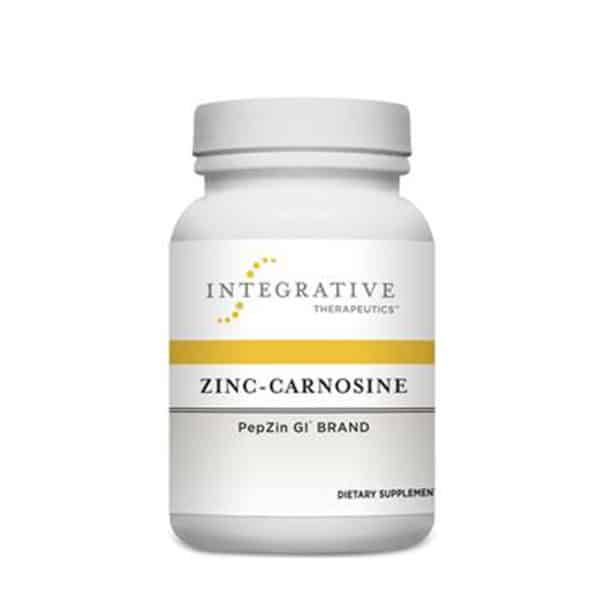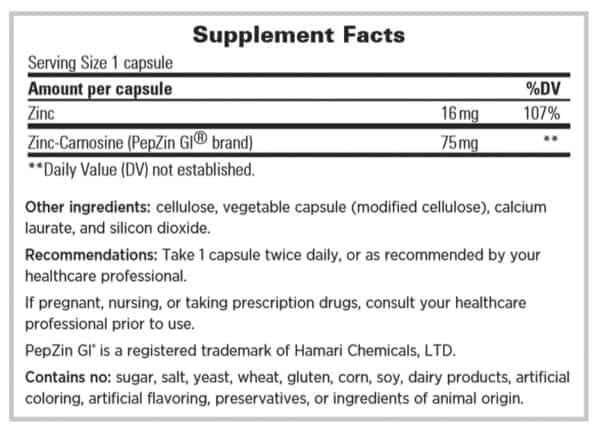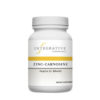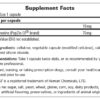Zinc-Carnosine (60 Capsules)
Zinc-Carnosine: Supporting the Natural Defense Mechanism of the Stomach*
$39.00
Description
Zinc-Carnosine is a novel dietary ingredient that supports gastrointestinal tissue health.* It has been successfully used in Japan since the early 1990s to support mucosal integrity, gastrointestinal immune defense, and occasional indigestion.*
Zinc-Carnosine is a unique combination of the essential mineral zinc. Zinc is a component of more than 300 enzymes needed for tissue repair; for morphologic, physiologic, and metabolic functions in the reproductive system; to synthesize protein; to preserve vision; and to boost immunity, among other functions.* L-carnosine is a dipeptide consisting of beta-alanine and L-histidine. It occurs in all mammalian cells, with the highest concentrations found in muscle and brain tissue.
Animal studies have shown that Zinc-Carnosine has biological activity surpassing that of the individual constituents or the same ingredients physically mixed together. Clinical trials have demonstrated significant improvements in both objective outcomes and subjective measures during intervention periods with Zinc-Carnosine (ZnC).* More importantly, clinical trials have shown endoscopically demonstrable effects within 4 to 8 weeks.* Dozens of research studies on PepZinGI® brand Zinc-Carnosine have been conducted, with a strong track record of clinical efficacy.
Mechanisms of Action While most digestive aids focus either on suppressing or neutralizing stomach acid, Zinc-Carnosine is unique in that it supports the natural cytoprotective mechanisms without interfering in the normal digestive process (i.e., it does not suppress stomach acid production or neutralize HCl, which is required for mineral absorption).* Instead, ZincCarnosine bolsters the stomach’s inherent mucosal defenses, stabilizing integrity of tissues not only of the stomach, but throughout the GI tract: in the mouth, small intestine, colon, and liver.* Zinc-Carnosine supports the body’s natural mechanisms for rapidly regenerating epithelia in the presence of various stressors.* It also supports healthy gastric balance of microflora in both animal studies as well as in humans.
In animal studies, Zinc-Carnosine has been shown to modulate the immunological cascade that can follow local tissue challenge to the stomach lining.* This includes effects on the release of cytokines, NF kappa-B activation, modulation of IGF-1,22 TNF-alpha, and induction of heme oxygenase (HO)-1.* The slow release of free zinc and L-carnosine in the stomach cellular space provides membrane-stabilizing effects, while at the same time providing a highly bioavailable source of elemental zinc.*
When the ingredient is released in the stomach, it is thought to adhere to needful areas of the gastric lining, supporting the inherent protective and regenerative functions of gastric mucosal cells.* A study by Furuta, et al showed via radioisotope identification that chelated Zinc-Carnosine stayed in the stomach twice as long (2 hours) as a physical mixture of zinc and L-carnosine similarly tagged.
Dosing Most clinical trials of Zinc-Carnosine used 37.5 to 75 mg twice daily (before breakfast and at bedtime) for 8 weeks. This amount provides 8 mg to 16 mg of elemental zinc per dose.
Zinc-Carnosine has not been evaluated for long-term use. Because zinc inhibits copper absorption, copper intake should be increased if zinc supplementation continues long-term (except when contraindicated). Typically, a 10:1 ratio of zinc to copper is recommended. Evidence suggests that 2 mg of copper per day is sufficient to prevent zinc-induced copper deficiency.
*THESE STATEMENTS HAVE NOT BEEN EVALUATED BY THE FOOD AND DRUG ADMINISTRATION. THESE PRODUCTS ARE NOT INTENDED TO DIAGNOSE, TREAT, CURE, OR PREVENT ANY DISEASE.




